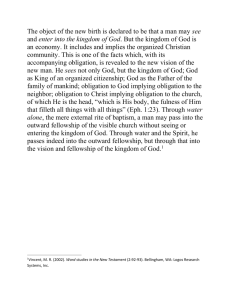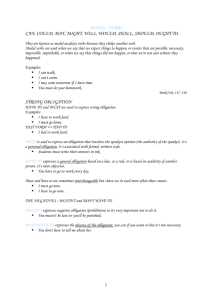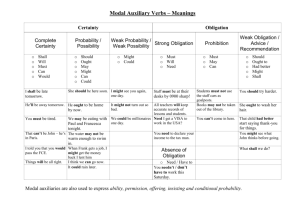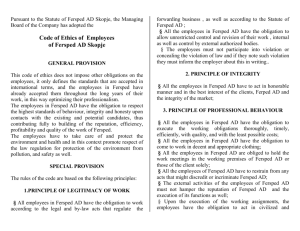Articles Work Obligations and the Farm
advertisement
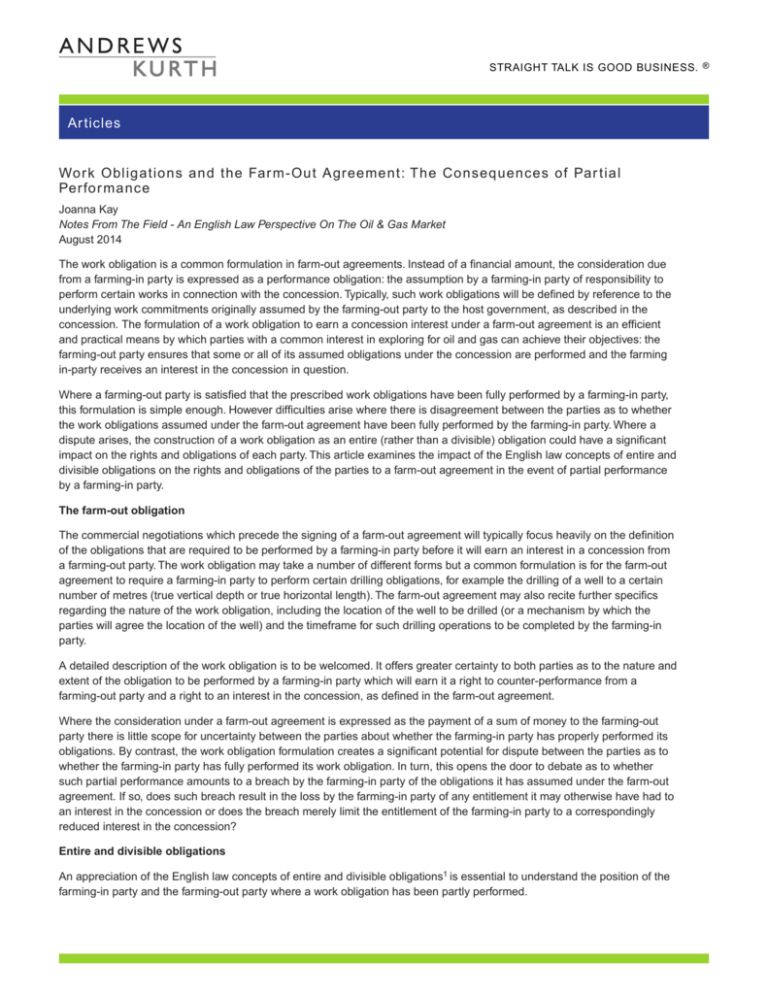
STRAIGHT TALK IS GOOD BUSINESS. ® Ar ticles Wor k Obligations and the Far m-Out Agreement: The Consequences of Par tial Perfor mance Joanna Kay Notes From The Field - An English Law Perspective On The Oil & Gas Market August 2014 The work obligation is a common formulation in farm-out agreements. Instead of a financial amount, the consideration due from a farming-in party is expressed as a performance obligation: the assumption by a farming-in party of responsibility to perform certain works in connection with the concession. Typically, such work obligations will be defined by reference to the underlying work commitments originally assumed by the farming-out party to the host government, as described in the concession. The formulation of a work obligation to earn a concession interest under a farm-out agreement is an efficient and practical means by which parties with a common interest in exploring for oil and gas can achieve their objectives: the farming-out party ensures that some or all of its assumed obligations under the concession are performed and the farming in-party receives an interest in the concession in question. Where a farming-out party is satisfied that the prescribed work obligations have been fully performed by a farming-in party, this formulation is simple enough. However difficulties arise where there is disagreement between the parties as to whether the work obligations assumed under the farm-out agreement have been fully performed by the farming-in party. Where a dispute arises, the construction of a work obligation as an entire (rather than a divisible) obligation could have a significant impact on the rights and obligations of each party. This article examines the impact of the English law concepts of entire and divisible obligations on the rights and obligations of the parties to a farm-out agreement in the event of partial performance by a farming-in party. The farm-out obligation The commercial negotiations which precede the signing of a farm-out agreement will typically focus heavily on the definition of the obligations that are required to be performed by a farming-in party before it will earn an interest in a concession from a farming-out party. The work obligation may take a number of different forms but a common formulation is for the farm-out agreement to require a farming-in party to perform certain drilling obligations, for example the drilling of a well to a certain number of metres (true vertical depth or true horizontal length). The farm-out agreement may also recite further specifics regarding the nature of the work obligation, including the location of the well to be drilled (or a mechanism by which the parties will agree the location of the well) and the timeframe for such drilling operations to be completed by the farming-in party. A detailed description of the work obligation is to be welcomed. It offers greater certainty to both parties as to the nature and extent of the obligation to be performed by a farming-in party which will earn it a right to counter-performance from a farming-out party and a right to an interest in the concession, as defined in the farm-out agreement. Where the consideration under a farm-out agreement is expressed as the payment of a sum of money to the farming-out party there is little scope for uncertainty between the parties about whether the farming-in party has properly performed its obligations. By contrast, the work obligation formulation creates a significant potential for dispute between the parties as to whether the farming-in party has fully performed its work obligation. In turn, this opens the door to debate as to whether such partial performance amounts to a breach by the farming-in party of the obligations it has assumed under the farm-out agreement. If so, does such breach result in the loss by the farming-in party of any entitlement it may otherwise have had to an interest in the concession or does the breach merely limit the entitlement of the farming-in party to a correspondingly reduced interest in the concession? Entire and divisible obligations An appreciation of the English law concepts of entire and divisible obligations1 is essential to understand the position of the farming-in party and the farming-out party where a work obligation has been partly performed. STRAIGHT TALK IS GOOD BUSINESS. ® Ar ticles An entire obligation will exist where the parties agree that the complete performance by the farming-in party of its obligations is necessary before the right of the farming-in party to require counter-performance from the farming-out party (for example, the transfer of the interest in question) arises. A divisible obligation will exist where the overall performance by the farming-in party is separable into different elements and attributed to different parts of the contract. The farming-in party’s performance can then be measured by reference to its performance of the individual contract parts, as distinct obligations. The difference between entire and divisible obligations can best be explained by reference to the difference between a lump sum contract and a contract structured on milestone-based performance targets. Under a lump sum contract formulation, payment is conditional upon performance of all of the works described in the contract. Under a milestone-based formulation, payment is made as each milestone is achieved. The failure by a performing party to complete a later milestone will not prejudice the obligation of the other party to make payment attributable to the completion of an earlier milestone. Where a farming-in party has performed only part of an entire obligation, then English law provides that the farming-in party can recover nothing2: neither the transfer of the interest defined in the farm-out agreement, nor a reduced interest proportionate to the extent of the work done. The construction of a work obligation as entire will therefore operate to the advantage of a farming-out party and the disadvantage of a farming-in party. The farming-in party will receive no interest in the concession, notwithstanding that it may have expended considerable time, effort and money in performing a large part of its obligations under the farm-out agreement. By contrast, the failure by a farming-in party to complete the entirety of its work obligation, where those obligations are construed as divisible obligations, will not be fatal to its right to claim the consideration due to it in respect of those elements that it has fully performed. The farming-out party will be entitled to receive an interest proportionate to those divisible elements of the work obligation that it has performed. The construction of a work obligation as divisible will therefore operate to the advantage of the farming-in party and may disadvantage a farming-out party. The farming-out party may be required to transfer a substantial portion of the interest defined in the farm-out agreement without receiving the benefit of a well which fully meets the specifications defined in the farm-out agreement. This will be a particular concern for a farming-out party where the work obligation specified in the farm-out agreement reflects the requirements of the host government in respect of the work commitments to be performed under the concession. The doctrine of substantial performance The uncertainty created by the existence of the concepts of entire and divisible obligations under English law is compounded by the treatment of these concepts in the English courts. A prime example of this is the so-called ‘doctrine of substantial performance’. The doctrine of substantial performance is an exception to the principle outlined above that partial performance of an entire obligation entitles the partial performer to nothing. The doctrine provides that where a party has substantially performed an entire obligation (but has not completed full performance) it is entitled to bring an action to recover the price payable, subject to admitting a counterclaim from the paying party which reflects the uncompleted portion of that entire obligation.3 What amounts to the ‘substantial’ performance of a contract will be a matter of fact, to be determined by reference to the contract. In the context of a farm-out agreement, the application of the doctrine of substantial performance could result in a farming-in party being entitled to the interest defined in the farm-out agreement provided that it has substantially performed (albeit not completed) its work obligation and subject to admitting a counterclaim from the farming-out party for damages in respect of the uncompleted elements of the obligation. The doctrine therefore operates to the advantage of a farming-in party. The doctrine has however been widely criticised by a number of academics. They argue that the doctrine is based on an inaccuracy in describing contracts (rather than particular obligations) as entire.4 Treitel, for example, argues that the doctrine of substantial performance is based on: STRAIGHT TALK IS GOOD BUSINESS. ® Ar ticles “…the error that contracts, as opposed to particular obligations, can be entire… To say that an obligation is entire means that it must be completely performed before payment becomes due…In relation to ‘entire’ obligations, there is no scope for any doctrine of substantial performance”.5 Following this interpretation, care must be taken to identify the obligation that is said to be entire from the other, non-entire, obligations assumed by a party under a contract. Under a farm-out agreement, for example, this distinction may exist between the following two obligations which may be assumed by a farming-in party: The obligation to drill a well to 2400 metres TVD The farm-out agreement may provide that the farming-out party’s obligation to transfer an interest is conditional upon the farming-in party drilling the well to 2400 metres TVD. If this is construed as an entire obligation, then the farming-in party may be able to claim that the doctrine of substantial performance applies and its partial and substantial performance of that obligation entitles it to bring an action to recover an interest in the concession, subject to a counterclaim in damages from the farming-out party. The obligation to conduct drilling operations in accordance with good industry practice The same farm-out agreement may separately provide that the farming-in party must conduct drilling operations in accordance with good industry practice. Where this latter obligation is not construed to be an entire obligation, there are two consequences that follow. Firstly, a failure by the farming-in party to drill the well in accordance with good industry practice will not in itself prevent the farming-in party from bringing a claim for counter-performance by the farming-in party under the farm-out agreement. Secondly, the doctrine of substantial performance will not apply to the obligation. Notwithstanding the criticism of a number of academics, there is nonetheless continuing judicial authority that supports the existence of the doctrine.6 The ongoing application of the doctrine of substantial performance by the courts perhaps serves to demonstrate the struggle that the courts face between the profoundly unjust results that a strict application of the concept of entire obligations can create for a party that has substantially performed its obligations under a contract and the desire of the courts to uphold the contractual bargain struck between the parties. From a practical perspective, however, the academic debate combined with inconsistent judicial treatment of the topic of partial performance, leaves the parties to a farm-out agreement in an uncertain position. Against this backdrop, the importance of clarity in the formulation of the work obligation due from the farming-in party becomes even more profound. Is there an entire obligation? The question of whether a work obligation is entire or not will always depend on the construction of the farm-out agreement in question and the obligations contained therein. That said, there are a number of factors that may be considered by the English courts in construing an obligation as ‘entire’:7 the time at which counter-performance becomes due and the method by which the extent of counter-performance is calculated; whether partial performance in itself conveys a benefit on the receiving party or whether only full performance will convey any benefit on the receiving party; the extent of the loss suffered by the performing party as a result of partially performing its obligations; whether the performing party has had a reasonable opportunity to correct any defect in its performance; what in general did the receiving party contract to receive, if the performance of an obligation which is not essential to the basic purpose of the contract has not been performed then that obligation will not be construed as entire; and what alternative remedies were available to the parties other than a withholding of the counter-performance. STRAIGHT TALK IS GOOD BUSINESS. ® Ar ticles Mitigating the uncertainty There are a number of options available to the parties to a farm-out agreement which may mitigate some of the uncertainty created by the academic debate and judicial treatment of the concept of entire obligations. The farming-out party will want to minimise the ability of a farming-in party to bring a claim for substantial performance. The farming-out party should therefore seek to include an express provision in the farm-out agreement which excludes the rights of the farming-in party to bring a claim for substantial performance. The farming-in party should take the opposite stance. It should resist any such express exclusion if it wishes to preserve the scope for it to bring a claim for substantial performance in the event that the work obligations under the farm-out agreement are construed as entire obligations. The inclusion of force majeure provisions in the farm-out agreement will offer the farming-in party relief from liability in the event of a supervening event which prevents the performance of its work obligation. This prevents the farming-in party from being in breach of its performance obligations under the contract. The existence of a force majeure provision will not go so far as to deem performance of the work obligation. However, a properly drafted force majeure provision may well recognise the circumstance where performance of the work obligation becomes impossible and provide for a contractual means for resolving that situation and a means by which both parties can extricate themselves from the contractual relationship created under the farm-out agreement. The parties may also choose to incorporate an alternative commercial construction into their farm-out agreement which further mitigates the impact to the parties of a performance failure by the farming-in party. Alternative performance – the farm-out agreement may recite an alternative set of work obligations which can be performed by the farming-in party in the event that it cannot perform the primary set of work obligations. This formulation enables the farming-out party to see the attainment of at least one of its commercial objectives in return for the dilution of its interest to the farming-out party. It also offers greater comfort to the farming-in party that its efforts in earning an interest from the farming-out party will not be unreasonably frustrated. Milestones – both parties may also take comfort in the certainty of knowing from the outset that the farm-out agreement has been formulated on the basis of a series of divisible obligations. The farm-out agreement should provide that the interest earned by the farming-in party will be proportionate to the amount of work it has completed. At a pre-agreed point in time, the parties (or, in the absence of agreement, an independent third party) will assess the amount of work completed by the farming-in party (either by reference to defined milestones or value). The farming-in party will receive a pre-agreed interest under the farm-out agreement corresponding to the amount of work it has completed. This formulation offers the farming-in party the comfort of knowing that the interest received by it will be commensurate to the extent or value of the works that it has performed and allays the concerns of the farming-out party that it might be required to dilute its interest in the concession to a disproportionate extent. The limitation of the commercial structures outlined above is that they do not address the issue of incomplete or unperformed works which could then impact on the security of the underlying concession. Where the performance of the work obligation under a farm-out agreement is intended to satisfy performance of one or more of the work commitments under the relevant concession, the parties will need to find an alternative means by which the concession obligations can be met. Conclusion Where such heavyweight legal academics as Chitty and Treitel cast doubt on the current treatment under English law of partial performance under a contract, there is clear cause for the layman to tread carefully. The work obligation formulation is an effective means by which parties with common aims can participate in petroleum operations in a particular concession. However, absolute clarity of drafting of the parties’ respective obligations (and the triggers to performance) is essential and there is merit in the parties considering the alternative commercial and contractual solutions that can be incorporated into the agreement which mitigate the impact to each of this legal uncertainty. STRAIGHT TALK IS GOOD BUSINESS. ® Ar ticles Other articles from this issue of Notes from the Field – An English Law Perspective On The Oil & Gas Market. The UK 14th Onshore Oil and Gas Licensing Round Unitisation – The Oil and Gas Industry’s Solution to One of Geology’s Many Conundrums Click here to contact Joanna Kay. 1. There is extensive academic debate around whether it is accurate to describe a contract as being ‘entire’ or ‘divisible’. This article follows the approach preferred by Professor Treitel and refers to obligations as being ‘entire’ or ‘divisible’. 2. Cutter v Powell (1795) 6.T.R. 320 and Appleby v Myers (1867) L.R.2 C.P. 660-661. 3. Chitty on Contracts 31st Ed, Volume 1 – General Principles, Part 7 – Performance and Discharge, Chapter 21 – Performance, para 21-033. 4. Chitty on Contracts 31st Ed, Volume 1 – General Principles, Part 7 – Performance and Discharge, Chapter 21 – Performance, para 21-029. 5. Treitel, Law of Contract, edited by E Peel, 13th Ed. (2011), para 17-040. 6. Dakin v Oxley (1864) 15 C.B. (N.S.) 646, 664-665, Bolton v Mahadeva [1972] 1 W.L.R. 1009 and Williams v Roffey Bros & Nicholls (Contractors) Ltd [1991] 1 Q B.1.8.-10, 17. 7. Law Quarterly Review 2002. In defence of Sumpter v Hedges, Robert Stevens and Ben McFarlane. A past performance or prior result is no guarantee of a similar future result in another case or matter. Andrews Kurth is responsible for the content of this website. Andrews Kurth, the Andrews Kurth logo, Straight Talk is Good Business and Intelligent Energy are registered service marks of Andrews Kurth LLP. Andrews Kurth LLP is a Texas limited liability partnership. Andrews Kurth (UK) LLP is authorized and regulated by the Solicitors Regulation Authority of England and Wales (SRA Registration No.598542). Andrews Kurth (Middle East) DMCC is registered and licensed as a Free Zone company under the rules and regulations of DMCCA. Attorney Advertising.



